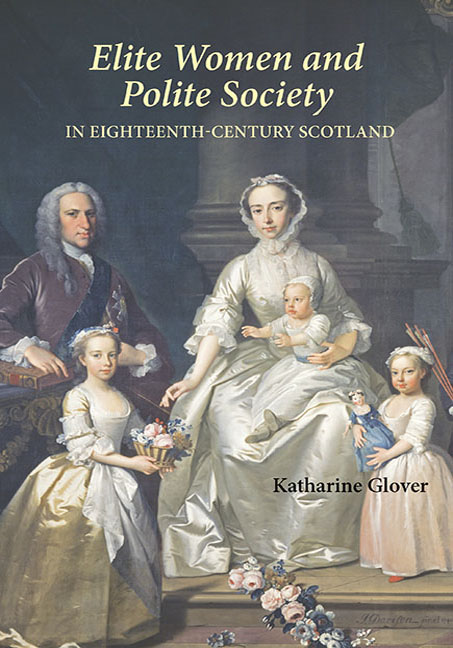Book contents
- Frontmatter
- Contenst
- Dedication
- Acknowledgements
- List of Abbreviations
- Preface
- 1 Elite Women and Eighteenth-Century Scottish Society
- 2 Education and Upbringing
- 3 Reading and Print Culture
- 4 Polite Sociability: Space and Social Practices
- 5 Politics and Influence
- 6 Travel, Tourism and Place
- Conclusion
- Appendix Biographical Backgrounds
- Bibliography
- Index
2 - Education and Upbringing
Published online by Cambridge University Press: 08 April 2017
- Frontmatter
- Contenst
- Dedication
- Acknowledgements
- List of Abbreviations
- Preface
- 1 Elite Women and Eighteenth-Century Scottish Society
- 2 Education and Upbringing
- 3 Reading and Print Culture
- 4 Polite Sociability: Space and Social Practices
- 5 Politics and Influence
- 6 Travel, Tourism and Place
- Conclusion
- Appendix Biographical Backgrounds
- Bibliography
- Index
Summary
In June 1745, Amelie Murray, a thirteen-year-old Edinburgh schoolgirl, took up her pen and wrote out the following letter:
Dear Madam
I received a letter this day, with the accounts of your being recoverd, from the small Pox: I don't know how any trivial mind, would bear the loss you have had, by them; I mean that of so much beauty, as before you enjoy'd; but you possess the beauties of the Mind, & have so many good Qualities, to make you esteemd by all, who are so happy as to know you. Its true, the Croud who Loved you only for your beauty, will forsake you: but I think you reap an advantage from that, for you will be able to distinguish, who were, your true, & who your feign'd Admirers; your real ones, will Love you the more, so see with what Patience, you bear this misfortune; which would be an infinite one to those, who have nothing to recommend them but a pretty face. I hope you will pardon this freedom, & forgive the faults of this scrall and believe it is all from Dear Madam your sincere friend and well-wisher, Amelia Murray.
Amelie sent this letter not to the ‘former beauty’ to whom it was addressed, but to her mother, Lady George Murray. As an accompanying note explained, writing this letter was part of the training in the skills and accomplishments deemed necessary to become a polite young lady, which was the reason for her residence in Edinburgh at this time. Each Friday, she explained to her mother, her writing master, Mr Demainbray, set his pupils a subject on which to write a letter for the following Friday. On this occasion he had asked his pupils to compose a letter ‘to a Lady who has lately had the small pox, & was a beauty before but is now much spoilt by them’. Other weeks the set topics ranged from subjects like ‘Sincerity and Compliments dont agree’ to ‘wishing a Gentleman joy who had lately Come to a great fortune & fine Equipage’, on which subject, she told her mother with pride, Mr Demainbray had particularly praised her effort.
- Type
- Chapter
- Information
- Publisher: Boydell & BrewerPrint publication year: 2011



